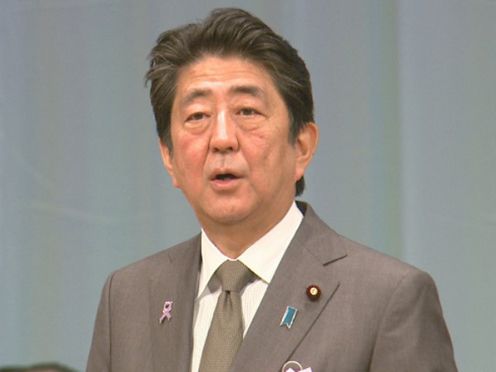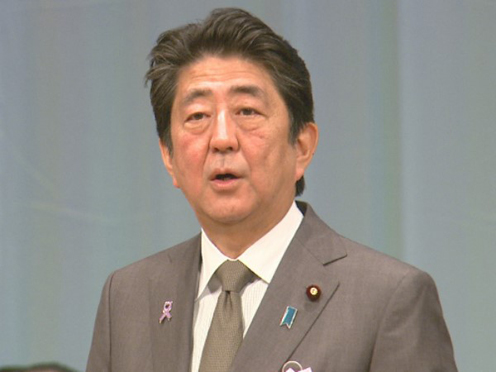Home > News > The Prime Minister in Action > November 2017 > National Convention of the Central Federation of Societies of Commerce and Industry
The Prime Minister in Action
National Convention of the Central Federation of Societies of Commerce and Industry
November 16, 2017
[Provisional Translation]
On November 16, 2017, Prime Minister Shinzo Abe attended the 57th National Convention of the Central Federation of Societies of Commerce and Industry held in Tokyo.
The Prime Minister said in his address,
“Attending this meeting fills me with a feeling of warmth, as if I have returned to my hometown. I am deeply pleased to see the 57th National Convention of the Central Federation of Societies of Commerce and Industry being held with such grandeur and the attendance of so many people affiliated with societies of commerce and industry.
First, I would like to offer my condolences to those who lost their lives in the torrential rains that hit Northern Kyushu in July and the recent Typhoon Lan, and extend my sincere sympathy for those affected by these disasters. I would like to express my heartfelt respect to all members of the designated societies of commerce and industry, who have supported those affected by this series of disasters and devoted their utmost efforts to the reconstruction of local communities.
Under five years of Abenomics, the number of company bankruptcies has fallen by 30% compared to the time before the Abe administration was inaugurated. Employment has also increased by 1.85 million jobs. In addition, the ratio of active job openings to applicants for regular employment exceeded 1.0 for the first time since this statistic was first recorded, and the employment rate of high school and university graduates this past spring was the highest ever. Japan’s economy, which for close to two decades has battled deflation and economic stagnation, is now steadily producing a positive cycle of growth. This thanks to your efforts as the backbone of Japan’s economy, and I would like to take this opportunity to express my appreciation.
At the same time, with the ratio of active job openings to applicants now above 1 for all 47 prefectures nationwide, the highest level in 43 years, labor shortages are becoming an ever more serious issue, and I believe many of you are facing difficult challenges as a result. However, I would like you to take this adversity and turn it into a major opportunity for the future. The Government will offer its full support to the efforts of small- and medium-sized enterprises (SMEs) to proactively invest in further productivity improvements, with an eye firmly on the future. Given that we live in an age in which our population is declining, I hope to spread the ripple effects of the productivity revolution to every corner of Japan.
To date, the Abe administration has taken steps to support SMEs to raise their productivity. Our various forms of support, including halving the fixed asset tax for proactive capital investments, have helped to enhance the management of 30,000 companies in just one year. We will now consider even bolder measures to support your investments even more strongly. The supplementary budget that is to be formulated by the end of this year includes a manufacturing subsidy program and will support the proactive investments of more than 10,000 companies. We will dedicate our fullest efforts to raising the productivity of small enterprises while further utilizing the business sustainability subsidy program, which we have been promoting together with you. At the same time as advancing these initiatives, we will promote work style reform while listening closely to your feedback to ensure these efforts do not place a large burden on SMEs.
In addition to labor shortages, another major area of concern is business successions. Over the next ten years more than 60% of business owners in Japan will be older than 70 years of age. Half of them, or 1.27 million people, have yet to find a successor. As a result, some of these SMEs will be forced to close despite being profitable and despite having future potential. This would be a major loss for Japan’s economy. I will come up with drastic budget and tax measures so as to facilitate the smooth and successful handover of your carefully nurtured and treasured businesses to the next generation.
Sustainable economic growth is not possible without vibrant SMEs. It is very much the vitality of SMEs, who underpin local economies, that has been and will continue to be the engine that drives Japan’s economy. Unless the fruits of the economic recovery are felt firsthand by everyone in this country, Abenomics cannot be considered a success. The Abe Cabinet has made fundamental revisions for the first time in 13 years to the operating standards of the Act against Delay in Payment of Subcontract Proceeds, etc. to Subcontractors, in light of the bullying of subcontractors that we have seen in recent years. We will now rigorously enforce these new standards to thoroughly crack down on this bullying and ensure that everyone can enjoy the warm winds of economic recovery. We will work hand in hand with the societies of commerce and industry to implement measures to protect subcontractors.
We will continue to pursue active and dynamic regional revitalization. In this regard, the role of the societies of commerce and industry, which deeply understand their local economies and work closely with the businesses operating there, will become ever more important. I ask for your understanding and support as the Abe Cabinet continues to take on new challenges. Let’s work together to address them.
In closing, I would like to conclude my congratulatory remarks by expressing my hope for the continued development of the SMEs of Japan, including all of you who are with us today.”


